A set of tedious roadworks on a major trunk road is not the first place you would expect to find a Roman treasure trove.
But that is exactly what workers on a £380 million upgrade to a 12 mile stretch of the A1 between Leeming Bar and Barton in Yorkshire have discovered.
Archaeologists have now unearthed a staggering 177,000 artefacts from a Roman settlement dating back to 60AD that was on the site.
They have said the discovery is helping to rewrite history and providing new insights into life in Britain during the Roman occupation.
And archaeologists have described the new discoveries as 're-writing history'.
Among the finds to have been recovered are a rare Roman brooch and a decorative miniature sword.
Archaeologists have also found the remnants of the town close to Scotch Corner, North Yorkshire, which could prove to be the earliest Roman settlement in the region.
Treasure trove of Roman artefacts found under the A1: Pots, beads and jewellery are among 177,000 pieces unearthed by roadworks
Archaeologists have unearthed more than 177,000 artefacts under the A1
The 12-mile stretch of road is between Leeming Bar and Barton, Yorkshire
They were found alongside a Roman settlement dating back to 60AD
Researchers have described the new discoveries as 're-writing history'
By Richard Gray for MailOnline
15 January 2016
Daily Mail
A set of tedious roadworks on a major trunk road is not the first place you would expect to find a Roman treasure trove.
But that is exactly what workers on a £380 million upgrade to a 12 mile stretch of the A1 between Leeming Bar and Barton in Yorkshire have discovered.
Archaeologists have now unearthed a staggering 177,000 artefacts from a Roman settlement dating back to 60AD that was on the site.
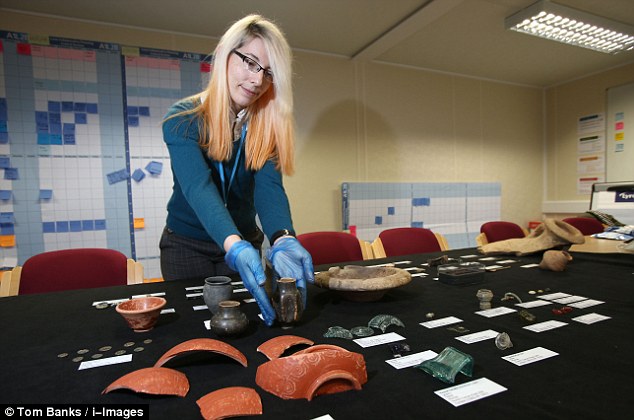
Archaeologists have unearthed a haul of more than 177,000 Roman artefacts under the A1 in Yorkshire. The discoveries have been described as 're-writing history'. Pictured is Dr Elizabeth Foulds with a selection of the treasures
They have said the discovery is helping to rewrite history and providing new insights into life in Britain during the Roman occupation.
And archaeologists have described the new discoveries as 're-writing history'.
Among the finds to have been recovered are a rare Roman brooch and a decorative miniature sword.
Archaeologists have also found the remnants of the town close to Scotch Corner, North Yorkshire, which could prove to be the earliest Roman settlement in the region.
The Romans are thought to have only come to York a decade later than the settlement is thought to have been built.
Dr Steve Sherlock, who has led the archeological project, said: 'We're effectively re-writing the history books, because we didn't know it was there or that there was anything so early.
'Conventional wisdom tells us that in AD71 the Romans came over the Humber and settled in places like York and near Boroughbridge - but this site is even earlier.'
Dr Sherlock described discovering traces of timber buildings, glass vessels, beads and even remnants of crops as 'quite spectacular'.
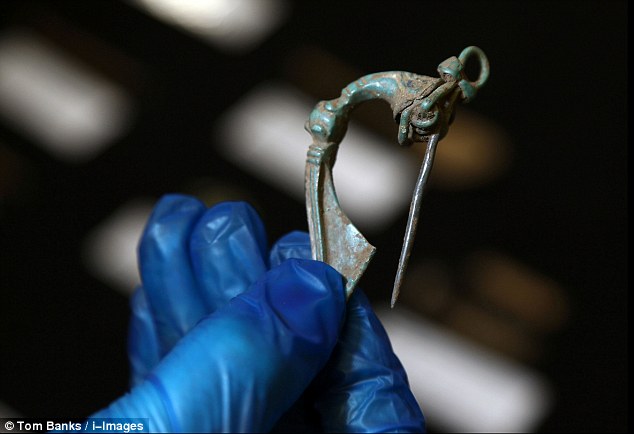
Among the finds to have been recovered is a rare Roman brooch (pictured) which would have been worn by Roman settlers in the area almost 2000 years ago
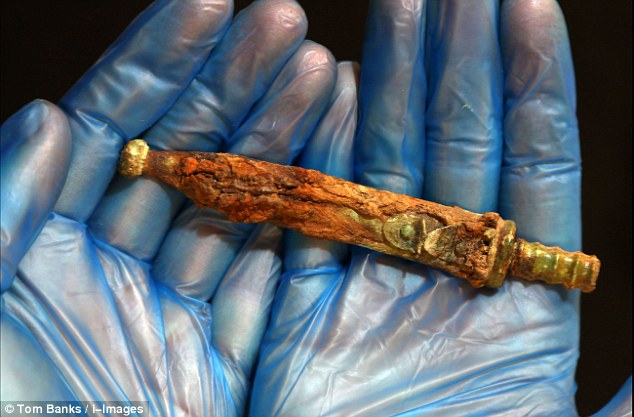
The Romans are thought to have only come to York a decade later than the settlement is thought to have been built. The dig site revealed ornamental as well as functional objects, such as this ornamental sword (pictured)
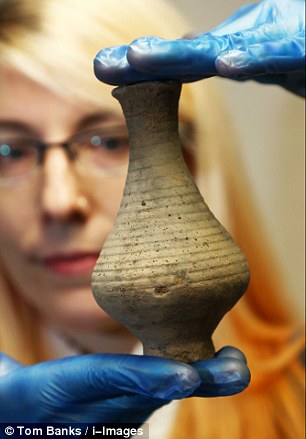
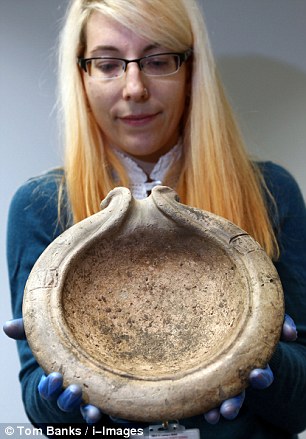
Over the past two years, over 60 archaeologists have been working along the old Roman route known as the Great North Road, which ran adjacent to the current A1. Among the finds are a vase (pictured left) as well as a mortarium (pictured right), which would have been used to grind and mix foods
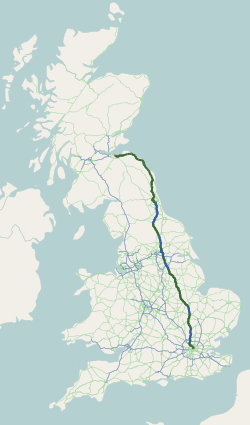
The A1 is the longest numbered road in the UK, at 410 miles. It connects London, the capital of England and the United Kingdom, with Edinburgh, the capital of Scotland
He said: 'We didn't just find one building, but a sequence of buildings going back hundreds of years, that nobody knew existed.
'We can understand the impact of the site because of the amount of time it was occupied - over 300 years.'
Over the past two years, over 60 archaeologists have been working along the old Roman route known as the Great North Road, which ran adjacent to the current A1.
Dr Sherlock explained that, although they expected to find Roman deposits the 'quality, quantity and extent went beyond expectations'.
Further discoveries have also been made at Catterick, North Yorks., which was occupied by the Romans around AD80.
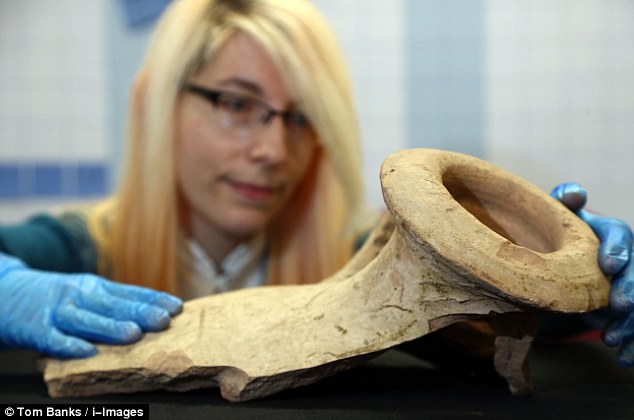
Some of the larger pottery pieces were from broken vessels, such as large jugs for carrying olive oil (pictured)
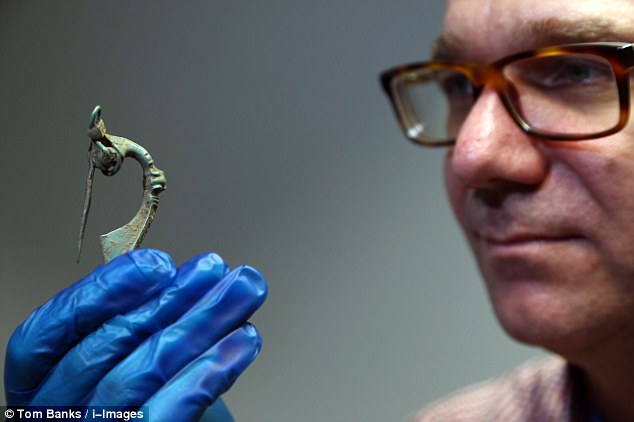
Dr Steve Sherlock (pictured), who led the archeological project, said: 'We're effectively re-writing the history books, because we didn't know it was there or that there was anything so early'
Here a Roman town called Bainesse, just south of Catterick, has previously been found and much knowledge has now been gained following the excavation of a cemetery with 246 burials dating back to the first and third century.
Some people were buried with pots, beads, jewellery and even hob nail boots.
The bones will now be analysed to determined their age, sex and cause of death which archaeologists hope will reveal a number of exciting things.
The team are due to leave Catterick later this month but will continue to study and verify the findings - some of which will go to the York Museum Trust.
Dr Hannah Russ, from Northern Archaeological Associates, said: 'The quality and preservation of the artefacts and environmental remains from this scheme is outstanding.'
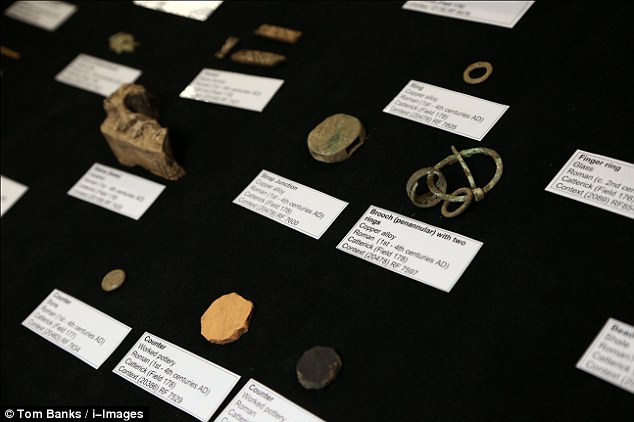
Further discoveries have also been made at Catterick, North Yorks, which was occupied by the Romans around AD80
WHAT DID THE ROMANS EVER DO FOR US - SPREAD PARASITES

The Romans are well known for introducing sanitation technology to Europe around 2,000 years ago.
Breakthroughs include public multi-seat latrines with washing facilities, sewerage systems, piped drinking water from aqueducts, and heated public baths for washing along with laws designed to keep their towns free of excrement and rubbish.
However, new research has found the number of intestinal parasites such as whipworm, roundworm and Entamoeba histolytica dysentery did not decrease as expected in Roman times - and actually increased from Iron Age levels.
The study is the first to use the archaeological evidence for parasites in Roman times to assess 'the health consequences of conquering an empire'.
The latest research was conducted by Dr Piers Mitchell from Cambridge's Archaeology and Anthropology Department and is published today in the journal Parasitology.
Dr Piers Mitchell brought together evidence of parasites in ancient latrines, human burials and 'coprolites' - or fossilised faeces - as well as in combs and textiles from numerous Roman Period excavations across the Roman Empire.
Not only did certain intestinal parasites appear to increase in prevalence with the coming of the Romans, but Mitchell also found that, despite their famous culture of regular bathing, 'ectoparasites' such as lice and fleas were just as widespread among Romans as in Viking and medieval populations, where bathing was not widely practised.
But that is exactly what workers on a £380 million upgrade to a 12 mile stretch of the A1 between Leeming Bar and Barton in Yorkshire have discovered.
Archaeologists have now unearthed a staggering 177,000 artefacts from a Roman settlement dating back to 60AD that was on the site.
They have said the discovery is helping to rewrite history and providing new insights into life in Britain during the Roman occupation.
And archaeologists have described the new discoveries as 're-writing history'.
Among the finds to have been recovered are a rare Roman brooch and a decorative miniature sword.
Archaeologists have also found the remnants of the town close to Scotch Corner, North Yorkshire, which could prove to be the earliest Roman settlement in the region.
Treasure trove of Roman artefacts found under the A1: Pots, beads and jewellery are among 177,000 pieces unearthed by roadworks
Archaeologists have unearthed more than 177,000 artefacts under the A1
The 12-mile stretch of road is between Leeming Bar and Barton, Yorkshire
They were found alongside a Roman settlement dating back to 60AD
Researchers have described the new discoveries as 're-writing history'
By Richard Gray for MailOnline
15 January 2016
Daily Mail
A set of tedious roadworks on a major trunk road is not the first place you would expect to find a Roman treasure trove.
But that is exactly what workers on a £380 million upgrade to a 12 mile stretch of the A1 between Leeming Bar and Barton in Yorkshire have discovered.
Archaeologists have now unearthed a staggering 177,000 artefacts from a Roman settlement dating back to 60AD that was on the site.

Archaeologists have unearthed a haul of more than 177,000 Roman artefacts under the A1 in Yorkshire. The discoveries have been described as 're-writing history'. Pictured is Dr Elizabeth Foulds with a selection of the treasures
They have said the discovery is helping to rewrite history and providing new insights into life in Britain during the Roman occupation.
And archaeologists have described the new discoveries as 're-writing history'.
Among the finds to have been recovered are a rare Roman brooch and a decorative miniature sword.
Archaeologists have also found the remnants of the town close to Scotch Corner, North Yorkshire, which could prove to be the earliest Roman settlement in the region.
The Romans are thought to have only come to York a decade later than the settlement is thought to have been built.
Dr Steve Sherlock, who has led the archeological project, said: 'We're effectively re-writing the history books, because we didn't know it was there or that there was anything so early.
'Conventional wisdom tells us that in AD71 the Romans came over the Humber and settled in places like York and near Boroughbridge - but this site is even earlier.'
Dr Sherlock described discovering traces of timber buildings, glass vessels, beads and even remnants of crops as 'quite spectacular'.

Among the finds to have been recovered is a rare Roman brooch (pictured) which would have been worn by Roman settlers in the area almost 2000 years ago

The Romans are thought to have only come to York a decade later than the settlement is thought to have been built. The dig site revealed ornamental as well as functional objects, such as this ornamental sword (pictured)


Over the past two years, over 60 archaeologists have been working along the old Roman route known as the Great North Road, which ran adjacent to the current A1. Among the finds are a vase (pictured left) as well as a mortarium (pictured right), which would have been used to grind and mix foods

The A1 is the longest numbered road in the UK, at 410 miles. It connects London, the capital of England and the United Kingdom, with Edinburgh, the capital of Scotland
He said: 'We didn't just find one building, but a sequence of buildings going back hundreds of years, that nobody knew existed.
'We can understand the impact of the site because of the amount of time it was occupied - over 300 years.'
Over the past two years, over 60 archaeologists have been working along the old Roman route known as the Great North Road, which ran adjacent to the current A1.
Dr Sherlock explained that, although they expected to find Roman deposits the 'quality, quantity and extent went beyond expectations'.
Further discoveries have also been made at Catterick, North Yorks., which was occupied by the Romans around AD80.

Some of the larger pottery pieces were from broken vessels, such as large jugs for carrying olive oil (pictured)

Dr Steve Sherlock (pictured), who led the archeological project, said: 'We're effectively re-writing the history books, because we didn't know it was there or that there was anything so early'
Here a Roman town called Bainesse, just south of Catterick, has previously been found and much knowledge has now been gained following the excavation of a cemetery with 246 burials dating back to the first and third century.
Some people were buried with pots, beads, jewellery and even hob nail boots.
The bones will now be analysed to determined their age, sex and cause of death which archaeologists hope will reveal a number of exciting things.
The team are due to leave Catterick later this month but will continue to study and verify the findings - some of which will go to the York Museum Trust.
Dr Hannah Russ, from Northern Archaeological Associates, said: 'The quality and preservation of the artefacts and environmental remains from this scheme is outstanding.'

Further discoveries have also been made at Catterick, North Yorks, which was occupied by the Romans around AD80
WHAT DID THE ROMANS EVER DO FOR US - SPREAD PARASITES

The Romans are well known for introducing sanitation technology to Europe around 2,000 years ago.
Breakthroughs include public multi-seat latrines with washing facilities, sewerage systems, piped drinking water from aqueducts, and heated public baths for washing along with laws designed to keep their towns free of excrement and rubbish.
However, new research has found the number of intestinal parasites such as whipworm, roundworm and Entamoeba histolytica dysentery did not decrease as expected in Roman times - and actually increased from Iron Age levels.
The study is the first to use the archaeological evidence for parasites in Roman times to assess 'the health consequences of conquering an empire'.
The latest research was conducted by Dr Piers Mitchell from Cambridge's Archaeology and Anthropology Department and is published today in the journal Parasitology.
Dr Piers Mitchell brought together evidence of parasites in ancient latrines, human burials and 'coprolites' - or fossilised faeces - as well as in combs and textiles from numerous Roman Period excavations across the Roman Empire.
Not only did certain intestinal parasites appear to increase in prevalence with the coming of the Romans, but Mitchell also found that, despite their famous culture of regular bathing, 'ectoparasites' such as lice and fleas were just as widespread among Romans as in Viking and medieval populations, where bathing was not widely practised.
Last edited: